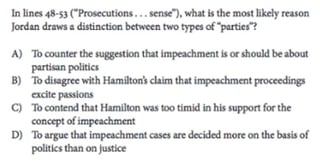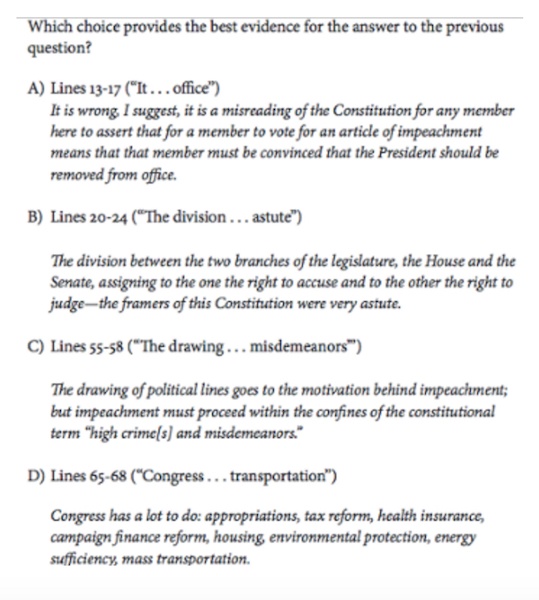
If you've found this article, you might have heard the term SAT Verbal. It's an older, outdated term to describe the SAT Reading and Writing section. However, the content of the SAT Verbal section is still very important today.
The many of the topics and skills from what used to be known as SAT Verbal are now tested in the SAT Evidence-Based Reading and Writing section. To do well on the Evidence-Based Reading and Writing section, you need to understand what SAT Verbal is, what types of skills it tests, and how to practice it.
What Is SAT Verbal?
SAT Verbal was the traditional term for the SAT Reading section. Before 2005, the SAT had only two sections: Verbal and Math. The sections were each scored on a scale of 200-800, and your composite SAT score ranged from 400-1600. Then, from 2005-2015, the SAT had three sections: Critical Reading, Math, and Writing. The Critical Reading Section was nearly the same as the pre-2005 SAT Verbal section, but analogy questions were eliminated.
Since 2016, the College Board has reverted to the old two-section system with scaled composite scores ranging from 400-1600. However, the two sections aren't Math and Verbal, but Math and Evidence-Based Reading and Writing.
Evidence-Based Reading and Writing combines elements of the 2005-2015 Verbal/Critical Reading section with elements of the Writing section. If you’re familiar with the 2005-2015 SAT, you know that the SAT Critical Reading/Verbal section asked two types of questions: sentence-completion and passage-based reading questions. On the new SAT, the SAT Evidence-Based Reading and Writing section will no longer have sentence-completion questions, but will still have passage-based reading questions.
What Verbal SAT Skills Are Tested on the New SAT?
As I said before, the only part of the SAT verbal remaining in the Evidence-Based Reading and Writing section is passage-based reading questions. The new SAT’s passage-based reading questions ask you questions related to five passages:
- 1 with a US and World Literature topic
- 2 with a History and Social Studies topic
- 2 with a Science topic
After reading each passage, you’ll be asked questions. The types of questions that you’ll be asked fall into eight categories (each utilizing a slightly different skill). The first six skills were required for the Critical Reading section on the old SAT. Skills 7 and 8 are new.
#1: Identify the Meaning of Vocabulary in Context
These questions ask you about to identify what a word means in the context of the passage. Sometimes, the word you’re asked about is common (not a very rare world like the old sentence completion words), though these common words are typically being used in an uncommon way in the passage. For example, the word may have multiple meanings and the less common meaning is being tested.
Sample Question
In line 88, "adhere" most nearly means
- to stick to a surface
- to believe in
- to preach
- to run away
#2: Recognize the Big Picture / Main Point of the Passage
These questions will ask you about the overall purpose of the passage. Is the passage meant to inform, review, contradict, prove, parody, hypothesize?
Sample Question
The primary purpose of the passage is to
- inform the public about a discovery
- review a work of art
- parody a well-known poem
- contradict a common claim
 Can you sift through the clutter?
Can you sift through the clutter?
#3: Recognize the Purpose of Small Details in the Passage
These questions usually refer to a specific line and ask you about a detail from that line. They may also ask what a phrase or paragraph is accomplishing in the context of the whole passage.
Sample Question
Which best describes the function of the statement in lines 47-48 ("To...final")?
- It summarizes the points made in the preceding paragraph.
- It provides support for the argument made in the first paragraph.
- It shows a surprising realization.
- It contrasts recent scientific findings.
#4: Infer the Meaning of a Line, Paragraph, or Entire Passage
These questions ask you to interpret the meaning of a line, a paragraph, or the whole passage. That may sound difficult, but don’t worry. These won't be asking for your subjective interpretation. There will always be only one correct answer to these questions.
Sample Question
The author of this passage would likely agree with which of the following statements about the "Dali" referred to in line 2?
- He should be more criticized.
- He was ahead of his time.
- He should be more widely known.
- He revolutionized modern art.
Ready to go beyond just reading about the SAT? Then you'll love the free five-day trial for our SAT Complete Prep program. Designed and written by PrepScholar SAT experts, our SAT program customizes to your skill level in over 40 subskills so that you can focus your studying on what will get you the biggest score gains.
Click on the button below to try it out!
#5: State the Function of a Phrase or Sentence in the Passage
These questions ask you to identify what effect a phrase or sentence has in the passage.
Sample Question
In lines 7, the author refers to his “scared smile” primarily to
- imply that Gerald had no feelings towards Ophelia.
- suggest that Gerald is excessively concerned about appearances.
- illustrate some of the exaggerated claims made Gerald’s uncle.
- emphasize the Gerald’s cowardice.
#6: Recognize the Author’s Tone, Style, Voice, Attitude, or Perspective
In these questions (known as Author Technique questions), you are asked to identify the author's tone, style, voice, attitude, or perspective.
Sample Question
The author discusses Peruvian culture from the perspective of
- a concerned spectator
- an awed traveler
- an established researcher
- a beloved native
#7: Interpret Data / Use Scientific Reasoning Skills (New Skill for 2016 SAT)
For these questions, you will be asked to interpret graphs or charts and choose which fact they best support or least support. You don't need to be a science or data expert to answer these questions correctly, but you’ll need to be proficient at reading and interpreting graphs and charts. Look at our ACT science articles for assistance with this skill as ACT science relies on the same skill.
#8: Provide Evidence Support *NEW Skill for 2016 SAT
These questions come in sets of two. The first asks a question about the passage, and the second question asks you to identify exactly where in the passage you found your evidence to answer the first question.
How to Practice
Your first step in your SAT Verbal practice should be to learn the test format and strategies, so you’re not surprised the day of the test. Learn more about each type of passage-based reading question, the best passage-based reading strategies, and the best way to study SAT vocabulary.
After acquiring this knowledge, you need to start taking SAT practice tests, if you haven’t already. Check out the best SAT reading comprehension practice tests and questions. Make sure to do an in-depth review after completing each practice test. Review is the most important step in your study process. You need to identify what mistakes you’re making, so you don’t make them the day of the test.
Following these steps will put you well on your way to raising your verbal SAT score!
What’s Next?
If you're taking the SAT, you should learn about the format of the new SAT, and also, check out some general tips on how to prepare for the SAT.
Before you start studying for the SAT, figure out what’s a good score for your target college.
Want to improve your SAT score by 160 points?
Check out our best-in-class online SAT prep program. We guarantee your money back if you don't improve your SAT score by 160 points or more.
Our program is entirely online, and it customizes what you study to your strengths and weaknesses. If you liked this Reading lesson, you'll love our program. Along with more detailed lessons, you'll get thousands of practice problems organized by individual skills so you learn most effectively. We'll also give you a step-by-step program to follow so you'll never be confused about what to study next.
Check out our 5-day free trial:
Have friends who also need help with test prep? Share this article!

As an SAT/ACT tutor, Dora has guided many students to test prep success. She loves watching students succeed and is committed to helping you get there. Dora received a full-tuition merit based scholarship to University of Southern California. She graduated magna cum laude and scored in the 99th percentile on the ACT. She is also passionate about acting, writing, and photography.





































 Holly R.
Holly R.